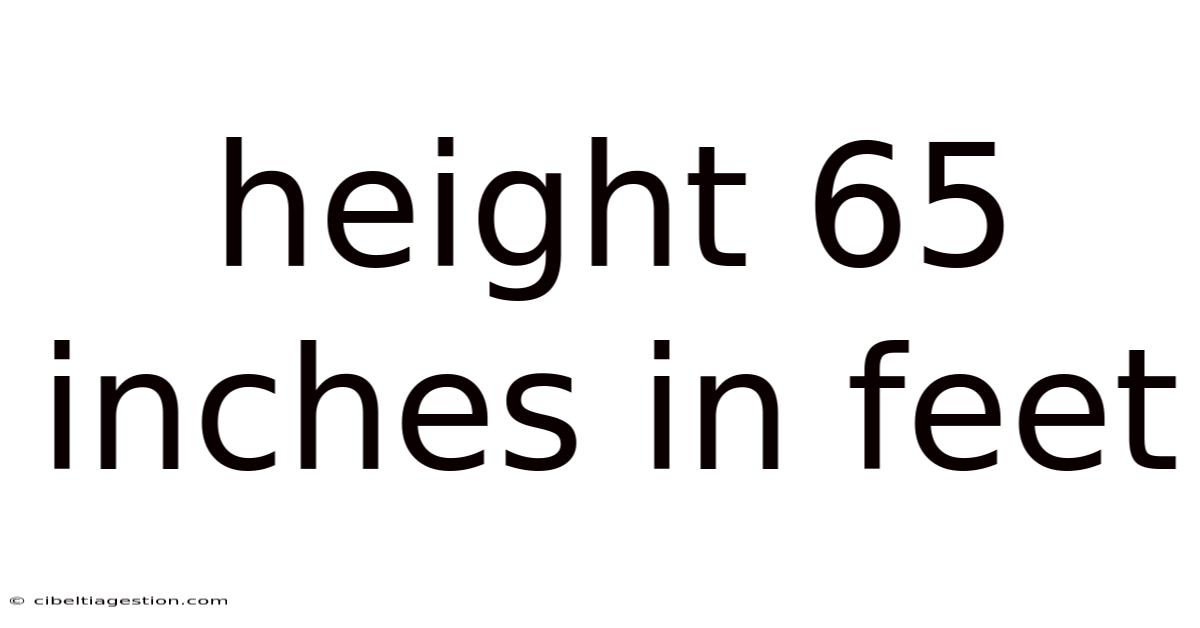Height 65 Inches In Feet
cibeltiagestion
Sep 16, 2025 · 4 min read

Table of Contents
Decoding 65 Inches: Understanding Height in Feet and Inches
Many people find themselves needing to convert measurements from inches to feet, particularly when discussing height. Understanding the relationship between inches and feet is crucial in various contexts, from healthcare and clothing sizes to construction and everyday conversations. This comprehensive guide will delve into the conversion of 65 inches to feet, explain the underlying principles, and provide additional information to help you confidently navigate height measurements. We'll explore the practical applications, address common questions, and provide a deeper understanding of the metric system for those who wish to explore alternative units.
Understanding the Conversion: Inches to Feet
The fundamental relationship between inches and feet is based on the fact that there are 12 inches in 1 foot. This is a standard unit conversion within the imperial system of measurement. To convert inches to feet, you simply divide the number of inches by 12.
Calculating 65 Inches in Feet
Let's apply this conversion to our specific question: how many feet are there in 65 inches?
65 inches / 12 inches/foot = 5.416666... feet
Therefore, 65 inches is equal to 5 feet and approximately 5 inches. The decimal part (0.416666...) represents the remaining inches after converting the whole number of feet. To find the remaining inches, we multiply the decimal part by 12:
0.416666... feet * 12 inches/foot ≈ 5 inches
Practical Applications: Why Knowing this Conversion Matters
Understanding how to convert inches to feet is far more than a simple mathematical exercise. It has significant practical implications across numerous fields:
-
Healthcare: Height is a critical measurement in healthcare. Doctors and other medical professionals use height to calculate BMI (Body Mass Index), assess growth and development, and monitor health conditions. Converting height measurements from inches to feet (and sometimes even to centimeters using the metric system) is a standard procedure.
-
Clothing and Apparel: Many clothing size charts use both inches and feet to specify measurements, particularly for items like trousers (pants) and jackets. Knowing the conversion is essential for purchasing clothes that fit properly.
-
Construction and Engineering: In construction and engineering, accurate measurements are paramount. Converting inches to feet is often necessary for blueprints, material estimations, and overall project planning.
-
Sports and Athletics: Height can play a role in various sports, affecting performance and player selection. Understanding height conversions is important for athletic record-keeping and analysis.
-
Everyday Life: Even in everyday conversations, knowing the conversion between inches and feet can improve communication and ensure clarity when discussing sizes and dimensions.
Beyond the Basics: Exploring the Metric System
While the imperial system (inches and feet) is commonly used in some parts of the world, the metric system (centimeters and meters) is the internationally preferred system. It's often easier to work with due to its decimal-based structure. Converting inches to centimeters allows for a broader perspective and improved compatibility with international standards.
To convert 65 inches to centimeters, we use the conversion factor: 1 inch ≈ 2.54 centimeters.
65 inches * 2.54 centimeters/inch ≈ 165.1 centimeters
This is roughly equal to 1.65 meters.
Frequently Asked Questions (FAQ)
-
Q: Is 5 feet and 5 inches the exact equivalent of 65 inches?
A: No, it's an approximation. The precise calculation yields 5.416666... feet, which rounds to 5 feet and 5 inches. The repeating decimal indicates that the conversion isn't perfectly exact.
-
Q: How do I convert feet and inches back to inches?
A: To convert feet and inches back to inches, multiply the number of feet by 12 and add the number of inches. For example, 5 feet 5 inches would be (5 * 12) + 5 = 65 inches.
-
Q: Are there any online calculators for this conversion?
A: Yes, many websites and apps offer unit conversion calculators that can quickly convert inches to feet and vice versa.
-
Q: Why is the imperial system still used?
A: The imperial system's continued use in some regions is largely due to historical reasons and established practices. However, the metric system's advantages in terms of simplicity and international standardization are increasingly recognized.
-
Q: Which unit of measurement is more precise?
A: Both systems can be equally precise depending on the measuring tools and techniques used. The metric system offers more convenient decimal conversions.
Conclusion: Mastering Height Conversions
Understanding the conversion between inches and feet is a valuable skill applicable across numerous domains. While the mathematical process is straightforward, the practical applications extend beyond simple calculations. This guide has provided not only the solution to converting 65 inches to feet but also a broader understanding of measurement systems, their applications, and the importance of accuracy in various contexts. Whether you're working in healthcare, construction, or simply engaging in everyday conversations, mastering this conversion will enhance your communication and problem-solving abilities. Remember that the seemingly simple act of converting units forms the foundation of more complex scientific and practical applications.
Latest Posts
Latest Posts
-
21 Degree C To F
Sep 16, 2025
-
Half A Cup To Oz
Sep 16, 2025
-
Mass Production Focuses On Producing
Sep 16, 2025
-
How Tall Is 67 In
Sep 16, 2025
-
1mg Equals How Many Mcg
Sep 16, 2025
Related Post
Thank you for visiting our website which covers about Height 65 Inches In Feet . We hope the information provided has been useful to you. Feel free to contact us if you have any questions or need further assistance. See you next time and don't miss to bookmark.